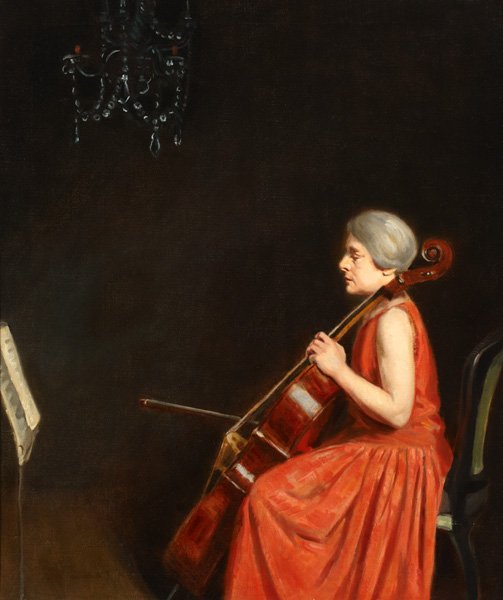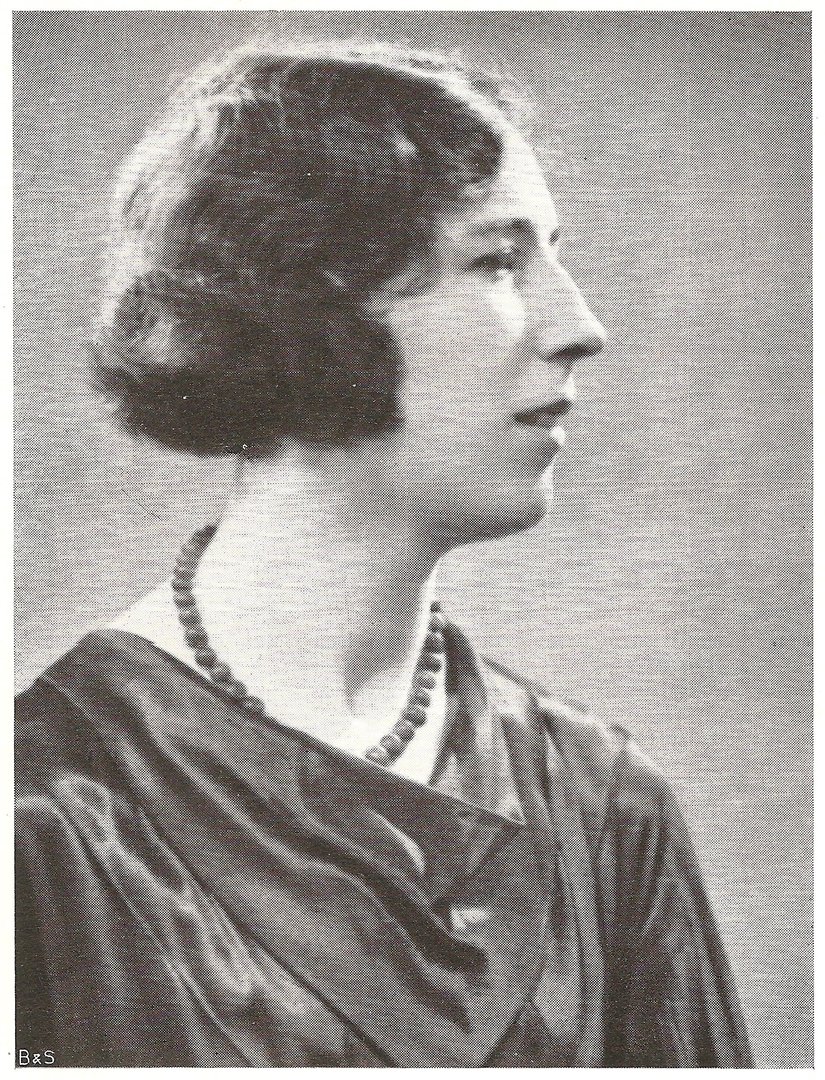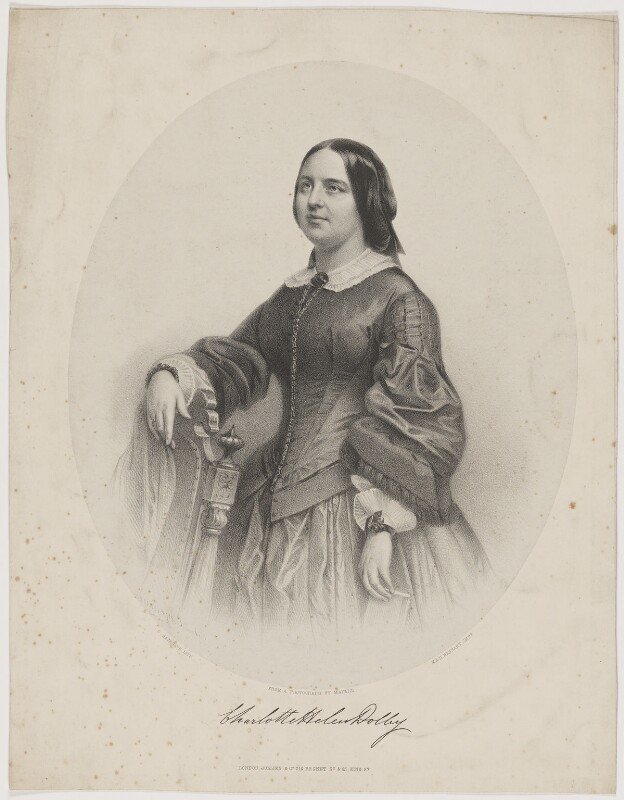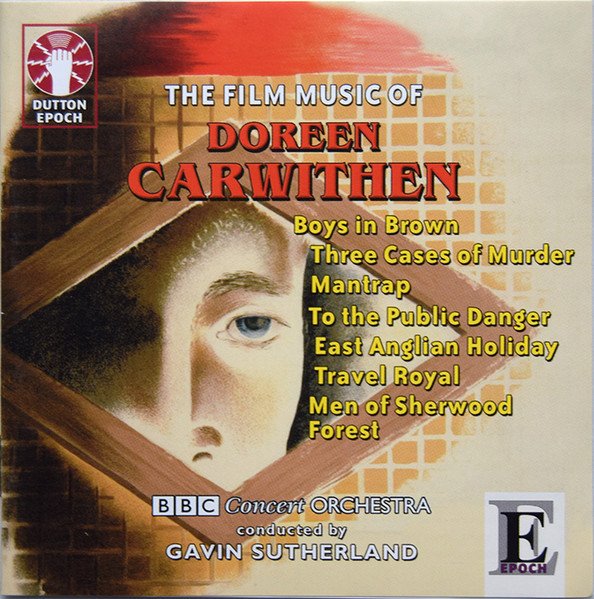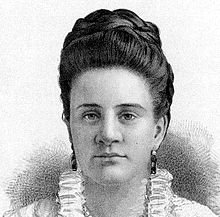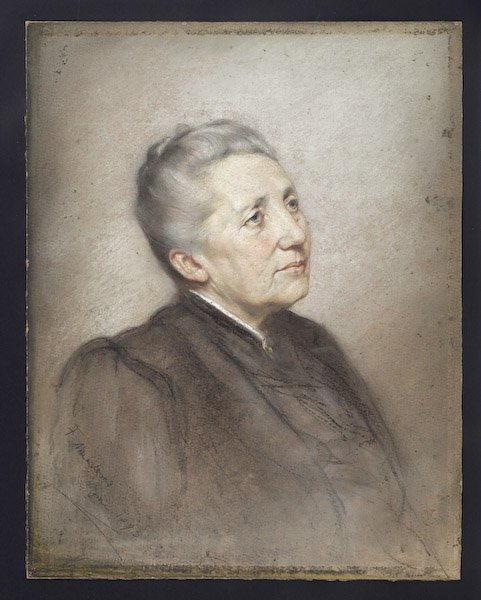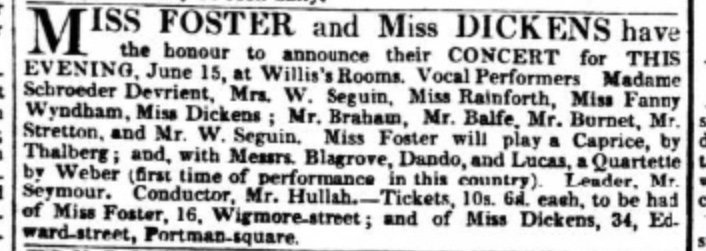Sara Teasdale: Four Winds
““Four winds blowing thro’ the sky,
You have seen poor maidens die,
Tell me then what I shall do
That my lover may be true.”
Said the wind from out the south,
“Lay no kiss upon his mouth,”
And the wind from out the west,
“Wound the heart within his breast,”
And the wind from out the east,
“Send him empty from the feast,”
And the wind from out the north,
“In the tempest thrust him forth;
When thou art more cruel than he,
Then will Love be kind to thee.””
Louise Guiney: Of Joan's Youth
“I would unto my fair restore
A simple thing:
The flushing cheek she had before!
Out-velveting
No more, no more,
On our sad shore,
The carmine grape, the moth’s auroral wing.
Ah, say how winds in flooding grass
Unmoor the rose;
Or guileful ways the salmon pass
To sea, disclose:
For so, alas,
With Love, alas,
With fatal, fatal Love a girlhood goes.”
Edith M. Thomas: "Frost Tonight"
“Apple-green west and an orange bar,
And the crystal eye of a lone, one star …
And, “Child, take the shears and cut what you will,
Frost to-night—so clear and dead-still.”
Then, I sally forth, half sad, half proud,
And I come to the velvet, imperial crowd,
The wine-red, the gold, the crimson, the pied,—
The dahlias that reign by the garden-side.
The dahlias I might not touch till to-night!
A gleam of the shears in the fading light,
And I gathered them all,—the splendid throng,
And in one great sheaf I bore them along.
. . . . . .
In my garden of Life with its all-late flowers
I heed a Voice in the shrinking hours:
“Frost to-night—so clear and dead-still” …
Half sad, half proud, my arms I fill.”
Nora May French: The Outer Gate
“Life said: “My house is thine with all its store;
Behold I open shining ways to thee—
Of every inner portal make thee free:
O child, I may not bar the outer door.
Go from me if thou wilt, to come no more;
But all thy pain is mine, thy flesh of me;
And must I bear thee, faint and woefully,
Call on me from the darkness and implore?”
Nay, mother, for I follow at thy will.
But oftentimes thy voice is sharp to hear,
Thy trailing fragrance heavy on the breath;
Always the outer hall is very still,
And on my face a pleasant wind and clear
Blows straitly from the narrow gate of Death.”
Edna St Vincent Millay: Renascence
“All I could see from where I stood
Was three long mountains and a wood;
I turned and looked another way,
And saw three islands in a bay.
So with my eyes I traced the line
Of the horizon, thin and fine,
Straight around till I was come
Back to where I’d started from;
And all I saw from where I stood
Was three long mountains and a wood.
Over these things I could not see;
These were the things that bounded me;
And I could touch them with my hand,
Almost, I thought, from where I stand.
And all at once things seemed so small
My breath came short, and scarce at all.
But, sure, the sky is big, I said;
Miles and miles above my head;
So here upon my back I’ll lie
And look my fill into the sky.
And so I looked, and, after all,
The sky was not so very tall.
The sky, I said, must somewhere stop,
And—sure enough!—I see the top!
The sky, I thought, is not so grand;
I ’most could touch it with my hand!
And, reaching up my hand to try,
I screamed to feel it touch the sky.
I screamed, and—lo!—Infinity
Came down and settled over me;
And, pressing of the Undefined
The definition on my mind,
Held up before my eyes a glass
Through which my shrinking sight did pass
Until it seemed I must behold
Immensity made manifold;
Whispered to me a word whose sound
Deafened the air for worlds around,
And brought unmuffled to my ears
The gossiping of friendly spheres,
The creaking of the tented sky,
The ticking of Eternity.
I saw and heard, and knew at last
The How and Why of all things, past,
And present, and forevermore.
The universe, cleft to the core,
Lay open to my probing sense
That, sick’ning, I would fain pluck thence
But could not,—nay! But needs must suck
At the great wound, and could not pluck
My lips away till I had drawn
All venom out.—Ah, fearful pawn!
For my omniscience paid I toll
In infinite remorse of soul.
All sin was of my sinning, all
Atoning mine, and mine the gall
Of all regret. Mine was the weight
Of every brooded wrong, the hate
That stood behind each envious thrust,
Mine every greed, mine every lust.
And all the while for every grief,
Each suffering, I craved relief
With individual desire,—
Craved all in vain! And felt fierce fire
About a thousand people crawl;
Perished with each,—then mourned for all!
A man was starving in Capri;
He moved his eyes and looked at me;
I felt his gaze, I heard his moan,
And knew his hunger as my own.
I saw at sea a great fog-bank
Between two ships that struck and sank;
A thousand screams the heavens smote:
And every scream tore through my throat.
No hurt I did not feel, no death
That was not mine; mine each last breath
That, crying, met an answering cry
From the compassion that was I.
All suffering mine, and mine its rod;
Mine, pity like the pity of God.
Ah, awful weight! Infinity
Pressed down upon the finite Me!
My anguished spirit, like a bird,
Beating against my lips I heard
Yet lay the weight so close about
There was no room for it without.
And so beneath the Weight lay I
And suffered death, but could not die.
Long had I lain thus, craving death,
When quietly the earth beneath
Gave way, and inch by inch, so great
At last had grown the crushing weight,
Into the earth I sank till I
Full six feet under ground did lie,
And sank no more,—there is no weight
Can follow here, however great.
From off my breast I felt it roll,
And as it went my tortured soul
Burst forth and fled in such a gust
That all about me swirled the dust.
Deep in the earth I rested now;
Cool is its hand upon the brow
And soft its breast beneath the head
Of one who is so gladly dead.
And all at once, and over all,
The pitying rain began to fall;
I lay and heard each pattering hoof
Upon my lowly, thatchèd roof,
And seemed to love the sound far more
Than ever I had done before.
For rain it hath a friendly sound
To one who’s six feet underground;
And scarce the friendly voice or face:
A grave is such a quiet place.
The rain, I said, is kind to come
And speak to me in my new home.
I would I were alive again
To kiss the fingers of the rain,
To drink into my eyes the shine
Of every slanting silver line,
To catch the freshened, fragrant breeze
From drenched and dripping apple-trees.
For soon the shower will be done,
And then the broad face of the sun
Will laugh above the rain-soaked earth
Until the world with answering mirth
Shakes joyously, and each round drop
Rolls, twinkling, from its grass-blade top.
How can I bear it; buried here,
While overhead the sky grows clear
And blue again after the storm?
O, multi-colored, multiform,
Beloved beauty over me,
That I shall never, never see
Again! Spring-silver, autumn-gold,
That I shall never more behold!
Sleeping your myriad magics through,
Close-sepulchred away from you!
O God, I cried, give me new birth,
And put me back upon the earth!
Upset each cloud’s gigantic gourd
And let the heavy rain, down-poured
In one big torrent, set me free,
Washing my grave away from me!
I ceased; and, through the breathless hush
That answered me, the far-off rush
Of herald wings came whispering
Like music down the vibrant string
Of my ascending prayer, and—crash!
Before the wild wind’s whistling lash
The startled storm-clouds reared on high
And plunged in terror down the sky,
And the big rain in one black wave
Fell from the sky and struck my grave.
I know not how such things can be
I only know there came to me
A fragrance such as never clings
To aught save happy living things;
A sound as of some joyous elf
Singing sweet songs to please himself,
And, through and over everything,
A sense of glad awakening.
The grass, a-tiptoe at my ear,
Whispering to me I could hear;
I felt the rain’s cool finger-tips
Brushed tenderly across my lips,
Laid gently on my sealèd sight,
And all at once the heavy night
Fell from my eyes and I could see,—
A drenched and dripping apple-tree,
A last long line of silver rain,
A sky grown clear and blue again.
And as I looked a quickening gust
Of wind blew up to me and thrust
Into my face a miracle
Of orchard-breath, and with the smell,—
I know not how such things can be!—
I breathed my soul back into me.
Ah! Up then from the ground sprang I
And hailed the earth with such a cry
As is not heard save from a man
Who has been dead, and lives again.
About the trees my arms I wound;
Like one gone mad I hugged the ground;
I raised my quivering arms on high;
I laughed and laughed into the sky,
Till at my throat a strangling sob
Caught fiercely, and a great heart-throb
Sent instant tears into my eyes;
O God, I cried, no dark disguise
Can e’er hereafter hide from me
Thy radiant identity!
Thou canst not move across the grass
But my quick eyes will see Thee pass,
Nor speak, however silently,
But my hushed voice will answer Thee.
I know the path that tells Thy way
Through the cool eve of every day;
God, I can push the grass apart
And lay my finger on Thy heart!
The world stands out on either side
No wider than the heart is wide;
Above the world is stretched the sky,—
No higher than the soul is high.
The heart can push the sea and land
Farther away on either hand;
The soul can split the sky in two,
And let the face of God shine through.
But East and West will pinch the heart
That cannot keep them pushed apart;
And he whose soul is flat—the sky
Will cave in on him by and by.”
Amy Lowell: A Winter Ride
“Who shall declare the joy of the running!
Who shall tell of the pleasures of flight!
Springing and spurning the tufts of wild heather,
Sweeping, wide-winged, through the blue dome of light.
Everything mortal has moments immortal,
Swift and God-gifted, immeasurably bright.
So with the stretch of the white road before me,
Shining snow crystals rainbowed by the sun,
Fields that are white, stained with long, cool, blue shadows,
Strong with the strength of my horse as we run.
Joy in the touch of the wind and the sunlight!
Joy! With the vigorous earth I am one.”
Josephine Dodge Daskam: The Prince
“My heart it was a cup of gold
That at his lip did long to lie,
But he hath drunk the red wine down,
And tossed the goblet by.
My heart it was a floating bird
That through the world did wander free,
But he hath locked it in a cage,
And lost the silver key.
My heart it was a white, white rose
That bloomed upon a broken bough,
He did but wear it for an hour,
And it is withered now.”
Grace Fallow Norton: Little Gray Songs from St Joseph's
“
I
With cassock black, baret and book,
Father Saran goes by;
I think he goes to say a prayer
For one who has to die.
Even so, some day, Father Saran
May say a prayer for me;
Myself meanwhile, the Sister tells,
Should pray unceasingly.
They kneel who pray: how may I kneel
Who face to ceiling lie,
Shut out by all that man has made
From God who made the sky?
They lift who pray—the low earth-born—
A humble heart to God:
But O, my heart of clay is proud—
True sister to the sod.
I look into the face of God,
They say bends over me;
I search the dark, dark face of God—
O what is it I see?
I see—who lie fast bound, who may
Not kneel, who can but seek—
I see mine own face over me,
With tears upon its cheek.
II
If my dark grandam had but known,
Or yet my wild grandsir,
Or the lord that lured the maid away
That was my sad mother,
O had they known, O had they dreamed
What gift it was they gave,
Would they have stayed their wild, wild love,
Nor made my years their slave?
Must they have stopped their hungry lips
From love at thought of me?
O life, O life, how may we learn
Thy strangest mystery?
Nay, they knew not, as we scarce know:
Their souls, O let them rest;
My life is pupil unto pain—
With him I make my quest.
III
My little soul I never saw,
Nor can I count its days;
I do not know its wondrous law
And yet I know its ways.
O it is young as morning-hours,
And old as is the night;
O it has growth of budding flowers,
Yet tastes my body’s blight.
And it is silent and apart,
And far and fair and still,
Yet ever beats within my heart,
And cries within my will.
And it is light and bright and strange,
And sees life far away,
Yet far with near can interchange
And dwell within the day.
My soul has died a thousand deaths,
And yet it does not die;
My soul has broke a thousand faiths,
And yet it cannot lie;
My soul—there’s naught can make it less;
My soul—there’s naught can mar;
Yet here it weeps with loneliness
Within its lonely star.
My soul—not any dark can bind,
Nor hinder any hand,
Yet here it weeps—long blind, long blind—
And cannot understand.”
Elsa Barker: “When I Am Dead and Sister to the Dust”
“When I am dead and sister to the dust;
When no more avidly I drink the wine
Of human love; when the pale Proserpine
Has covered me with poppies, and cold rust
Has cut my lyre-strings, and the sun has thrust
Me underground to nourish the world-vine,—
Men shall discover these old songs of mine,
And say: This woman lived—as poets must!
This woman lived and wore life as a sword
To conquer wisdom; this dead woman read
In the sealed Book of Love and underscored
The meanings. Then the sails of faith she spread,
And faring out for regions unexplored,
Went singing down the River of the Dead.”
Willa Cather: "Grandmither, Think Not I Forget"
“Grandmother, think not I forget, when I come back to town,
An’ wander the old ways again, an’ tread them up and down.
I never smell the clover bloom, nor see the swallows pass.
Wi’out I mind how good ye were unto a little lass;
I never hear the winter rain a-pelting all night through
Wi’out I think and mind me of how cold it falls on you.
An’ if I come not often to your bed beneath the thyme,
Mayhap ’t is that I’d change wi’ ye, and gie my bed for thine,
Would like to sleep in thine.
I never hear the summer winds among the roses blow
Wi’out I wonder why it was ye loved the lassie so.
Ye gave me cakes and lollipops and pretty toys a score—
I never thought I should come back and ask ye now for more.
Grandmither, gie me your still white hands that lie upon your breast,
For mine do beat the dark all night and never find me rest;
They grope among the shadows an’ they beat the cold black air,
They go seekin’ in the darkness, an’ they never find him there,
They never find him there.
Grandmither, gie me your sightless eyes, that I may never see
His own a-burnin’ full o’ love that must not shine for me.
Grandmither, gie me your peaceful lips, white as the kirkyard snow,
For mine be tremblin’ wi’ the wish that he must never know.
Grandmither, gie me your clay-stopped ears, that I may never hear
My lad a-singin’ in the night when I am sick wi’ fear;
A-singin’ when the moonlight over a’ the land is white—
Ah, God! I’ll up and go to him, a-singin’ in the night,
A-callin’ in the night.
Grandmither, gie me your clay-cold heart, that has forgot to ache,
For mine be fire wi’in my breast an’ yet it cannot break.
Wi’ every beat it’s callin’ for things that must not be,—
So can ye not let me creep in an’ rest awhile by ye?
A little lass afeard o’ dark slept by ye years agone—
An’ she has found what night can hold ’twixt sunset an’ the dawn:
So when I plant the rose an’ rue above your grave for ye,
Ye’ll know it’s under rue an’ rose that I would like to be,
That I would like to be.”
Olive Tilford Dargan: There's Rosemary
“
O Love that is not Love, but dear, so dear!
That is not love because it goes full soon,
Like flower born and dead within one moon,
And yet is love, for that it comes too near
The guarded fane where love alone may peer,
Ere, like young spring by summer soon outshone,
It trembles into death; yet comes anon
As thoughts of spring will come though summer’s here.
O star prelusive to a dream more fair,
Within my heart I’ll keep a heaven for thee
Where thou mayst freely come and freely go,
Touching with thy faint gold ere I am ’ware
A twilight hope—a dawn I did not see—
O love that is not Love, but nearly so!”
Sara Teasdale: Sappho
“The twilight’s inner flame grows blue and deep,
And in my Lesbos, over leagues of sea,
The temples glimmer moonwise in the trees.
Twilight has veiled the little flower face
Here on my heart, but still the night is kind
And leaves her warm sweet weight against my breast.
Am I that Sappho who would run at dusk
Along the surges creeping up the shore
When tides came in to ease the hungry beach,
And running, running, till the night was black,
Would fall forespent upon the chilly sand
And quiver with the winds from off the sea?
Ah, quietly the shingle waits the tides
Whose waves are stinging kisses, but to me
Love brought no peace, nor darkness any rest.
I crept and touched the foam with fevered hands
And cried to Love, from whom the sea is sweet,
From whom the sea is bitterer than death.
Ah, Aphrodite, if I sing no more
To thee, God’s daughter, powerful as God,
It is that thou hast made my life too sweet
To hold the added sweetness of a song.
There is a quiet at the heart of love,
And I have pierced the pain and come to peace.
I hold my peace, my Cleïs, on my heart;
And softer than a little wild bird’s wing
Are kisses that she pours upon my mouth.
Ah, never any more when spring like fire
Will flicker in the newly opened leaves,
Shall I steal forth to seek for solitude
Beyond the lure of light Alcæus’ lyre,
Beyond the sob that stilled Erinna’s voice.
Ah, never with a throat that aches with song,
Beneath the white uncaring sky of spring,
Shall I go forth to hide awhile from Love
The quiver and the crying of my heart.
Still I remember how I strove to flee
The love-note of the birds, and bowed my head
To hurry faster, but upon the ground
I saw two wingèd shadows side by side,
And all the world’s spring passion stifled me.
Ah, Love, there is no fleeing from thy might,
No lonely place where thou hast never trod,
No desert thou hast left uncarpeted
With flowers that spring beneath thy perfect feet.
In many guises didst thou come to me;
I saw thee by the maidens while they danced,
Phaon allured me with a look of thine,
In Anactoria I knew thy grace,
I looked at Cercolas and saw thine eyes;
But never wholly, soul and body mine,
Didst thou bid any love me as I loved.
Now I have found the peace that fled from me;
Close, close, against my heart I hold my world.
Ah, Love that made my life a lyric cry,
Ah, Love that tuned my lips to lyres of thine,
I taught the world thy music, now alone
I sing for one who falls asleep to hear.”
Helen Gray Cone: The Ride to the Lady
““Now since mine even is come at last,—
For I have been the sport of steel,
And hot life ebbeth from me fast,
And I in saddle roll and reel,—
Come bind me, bind me on my steed!
Of fingering leech I have no need!”
The chaplain clasped his mailèd knee.
“Nor need I more thy whine and thee!
No time is left my sins to tell;
But look ye bind me, bind me well!”
They bound him strong with leathern thong,
For the ride to the lady should be long.
Day was dying; the poplars fled,
Thin as ghosts, on a sky blood-red;
Out of the sky the fierce hue fell,
And made the streams as the streams of hell.
All his thoughts as a river flowed,
Flowed aflame as fleet he rode,
Onward flowed to her abode,
Ceased at her feet, mirrored her face.
(Viewless Death apace, apace,
Rode behind him in that race.)
“Face, mine own, mine alone,
Trembling lips my lips have known,
Birdlike stir of the dove-soft eyne
Under the kisses that make them mine!
Only of thee, of thee, my need!
Only to thee, to thee, I speed!”
The Cross flashed by at the highway’s turn;
In a beam of the moon the Face shone stern.
Far behind had the fight’s din died;
The shuddering stars in the welkin wide
Crowded, crowded, to see him ride.
The beating hearts of the stars aloof
Kept time to the beat of the horse’s hoof.
“What is the throb that thrills so sweet?
Heart of my lady, I feel it beat!”
But his own strong pulse the fainter fell,
Like the failing tongue of a hushing bell.
The flank of the great-limbed steed was wet
Not alone with the started sweat.
Fast, and fast, and the thick black wood
Arched its cowl like a black friar’s hood;
Fast, and fast, and they plunged therein,—
But the viewless rider rode to win.
Out of the wood to the highway’s light
Galloped the great-limbed steed in fright;
The mail clashed cold, and the sad owl cried,
And the weight of the dead oppressed his side.
Fast, and fast, by the road he knew;
And slow, and slow, the stars withdrew;
And the waiting heaven turned weirdly blue,
As a garment worn of a wizard grim.
He neighed at the gate in the morning dim.
She heard no sound before her gate,
Though very quiet was her bower.
All was as her hand had left it late:
The needle slept on the broidered vine,
Where the hammer and spikes of the passion-flower
Her fashioning did wait.
On the couch lay something fair,
With steadfast lips and veilèd eyne;
But the lady was not there.
On the wings of shrift and prayer,
Pure as winds that winnow snow,
Her soul had risen twelve hours ago.
The burdened steed at the barred gate stood,
No whit the nearer to his goal.
Now God’s great grace assoil the soul
That went out in the wood!”
Theodosia Garrison: The Tears of Harlequin
“TO you he gave his laughter and his jest,
His words that of all words were merriest,
His glad, mad moments when the lights flared high
And his wild song outshrilled the plaudits’ din.
For you that memory, but happier I—
I, who have known the tears of Harlequin.
Not mine those moments when the roses lay
Like red spilled wine on his triumphant way,
And shouts acclaimed him through the music’s beat,
Above the voice of flute and violin.
But I have known his hour of sore defeat—
I—have known the tears of Harlequin.
Light kisses and light words, they were not mine—
Poor perquisites of many a Columbine
Bought with his laughter, flattered by his jest;
But when despair broke through the painted grin,
His tortured face has fallen on my breast—
I—I have known the tears of Harlequin.
You weep for him, who look upon him dead,
That joy and jest and merriment are fled;
You weep for him, what time my eyes are dry,
Knowing what peace a weary soul may win
Stifled by too much masking—even I—
I, who have known the tears of Harlequin.”
Josephine Peabody: The Nightingale Unheard
“Yes, Nightingale, through all the summer-time
We followed on, from moon to golden moon;
From where Salerno day-dreams in the noon,
And the far rose of Pæstum once did climb.
All the white way beside the girdling blue,
Through sun-shrill vines and campanile chime,
We listened;—from the old year to the new.
Brown bird, and where were you?
You, that Ravello lured not, throned on high
And filled with singing out of sun-burned throats?
Nor yet Minore of the flame-sailed boats;
Nor yet—of all bird-song should glorify—
Assisi, Little Portion of the blest,
Assisi, in the bosom of the sky,
Where God’s own singer thatched his sunward nest
That little, heavenliest!
And north and north, to where the hedge-rows are,
That beckon with white looks an endless way;
Where, through the fair wet silverness of May,
A lamb shines out as sudden as a star,
Among the cloudy sheep; and green, and pale,
The may-trees reach and glimmer, near or far,
And the red may-trees wear a shining veil.
And still, no nightingale!
The one vain longing,—through all journeyings,
The one: in every hushed and hearkening spot,—
All the soft-swarming dark where you were not,
Still longed for! Yes, for sake of dreams and wings,
And wonders, that your own must ever make
To bower you close, with all hearts’ treasurings;
And for that speech toward which all hearts do ache;—
Even for Music’s sake.
But most, his music whose belovèd name
Forever writ in water of bright tears,
Wins to one grave-side even the Roman years,
That kindle there the hallowed April flame
Of comfort-breathing violets. By that shrine
Of Youth, Love, Death, forevermore the same,
Violets still!—When falls, to leave no sign,
The arch of Constantine.
Most for his sake we dreamed. Tho’ not as he,
From that lone spirit, brimmed with human woe.
Your song once shook to surging overflow.
How was it, sovran dweller of the tree,
His cry, still throbbing in the flooded shell
Of silence with remembered melody,
Could draw from you no answer to the spell?
—O Voice, O Philomel?
Long time we wondered (and we knew not why):—
Nor dream, nor prayer, of wayside gladness born,
Nor vineyards waiting, nor reproachful thorn,
Nor yet the nested hill-towns set so high
All the white way beside the girdling blue,—
Nor olives, gray against a golden sky,
Could serve to wake that rapturous voice of you;
But the wise silence knew.
O Nightingale unheard!—Unheard alone,
Throughout that woven music of the days
From the faint sea-rim to the market-place,
And ring of hammers on cathedral stone!
So be it, better so: that there should fail
For sun-filled ones, one blessèd thing unknown.
To them, be hid forever,—and all hail!
Sing never, Nightingale.
Sing, for the others! Sing; to some pale cheek
Against the window, like a starving flower.
Loose, with your singing, one poor pilgrim hour
Of journey, with some Heart’s Desire to seek.
Loose, with your singing, captives such as these
In misery and iron, hearts too meek,
For voyage—voyage over dreamful seas
To lost Hesperides.
Sing not for free-men. Ah, but sing for whom
The walls shut in; and even as eyes that fade,
The windows take no heed of light nor shade,—
The leaves are lost in mutterings of the loom.
Sing near! So in that golden overflowing
They may forget their wasted human bloom;
Pay the devouring days their all, unknowing,—
Reck not of life’s bright going!
Sing not for lovers, side by side that hark;
Nor unto parted lovers, save they be
Parted indeed by more than makes the Sea,
Where never hope shall meet—like mounting lark—
Far Joy’s uprising; and no memories
Abide to star the music-haunted dark:
To them that sit in darkness, such as these,
Pour down, pour down heart’s-ease.
Not in Kings’ gardens. No; but where there haunt
The world’s forgotten, both of men and birds;
The alleys of no hope and of no words,
The hidings where men reap not, though they plant;
But toil and thirst—so dying and so born;—
And toil and thirst to gather to their want,
From the lean waste, beyond the daylight’s scorn,
—To gather grapes of thorn!
. . . . . .
And for those two, your pilgrims without tears,
Who prayed a largess where there was no dearth,
Forgive it to their human-happy ears:
Forgive it them, brown music of the Earth,
Unknowing,—though the wiser silence knew!
Forgive it to the music of the spheres
That while they walked together so, the Two
Together,—heard not you.”
Florence Wilkinson: The Heart's Country
“Hill people turn to their hills;
Sea-folk are sick for the sea:
Thou art my land and my country,
And my heart calls out for thee.
The bird beats his wings for the open,
The captive burns to be free;
But I—I cry at thy window,
For thou art my liberty.”
Anna Hempstead Branch: Songs for my Mother
“I
HER HANDS
My mother’s hands are cool and fair,
They can do anything.
Delicate mercies hide them there
Like flowers in the spring.
When I was small and could not sleep,
She used to come to me,
And with my cheek upon her hand
How sure my rest would be.
For everything she ever touched
Of beautiful or fine,
Their memories living in her hands
Would warm that sleep of mine.
Her hands remember how they played
One time in meadow streams,—
And all the flickering song and shade
Of water took my dreams.
Swift through her haunted fingers pass
Memories of garden things;—
I dipped my face in flowers and grass
And sounds of hidden wings.
One time she touched the cloud that kissed
Brown pastures bleak and far;—
I leaned my cheek into a mist
And thought I was a star.
All this was very long ago
And I am grown; but yet
The hand that lured my slumber so
I never can forget.
For still when drowsiness comes on
It seems so soft and cool,
Shaped happily beneath my cheek,
Hollow and beautiful.
II
HER WORDS
My mother has the prettiest tricks
Of words and words and words.
Her talk comes out as smooth and sleek
As breasts of singing birds.
She shapes her speech all silver fine
Because she loves it so.
And her own eyes begin to shine
To hear her stories grow.
And if she goes to make a call
Or out to take a walk
We leave our work when she returns
And run to hear her talk.
We had not dreamed these things were so
Of sorrow and of mirth.
Her speech is as a thousand eyes
Through which we see the earth.
God wove a web of loveliness,
Of clouds and stars and birds,
But made not any thing at all
So beautiful as words.
They shine around our simple earth
With golden shadowings,
And every common thing they touch
Is exquisite with wings.
There’s nothing poor and nothing small
But is made fair with them.
They are the hands of living faith
That touch the garment’s hem.
They are as fair as bloom or air,
They shine like any star,
And I am rich who learned from her
How beautiful they are.”
Theresa Helburn: Mother
“I have praised many loved ones in my song,
And yet I stand
Before her shrine, to whom all things belong,
With empty hand.
Perhaps the ripening future holds a time
For things unsaid;
Not now; men do not celebrate in rhyme
Their daily bread.”
Florence Earle Coates: Song
“For me the jasmine buds unfold
And silver daisies star the lea,
The crocus hoards the sunset gold,
And the wild rose breathes for me.
I feel the sap through the bough returning,
I share the skylark’s transport fine,
I know the fountain’s wayward yearning,
I love, and the world is mine!
I love, and thoughts that sometime grieved,
Still well remembered, grieve not me;
From all that darkened and deceived
Upsoars my spirit free.
For soft the hours repeat one story,
Sings the sea one strain divine;
My clouds arise all flushed with glory—
I love, and the world is mine!”
Lizette Woodworth Reese: That Day You Came
“Such special sweetness was about
That day God sent you here,
I knew the lavender was out,
And it was mid of year.
Their common way the great winds blew,
The ships sailed out to sea;
Yet ere that day was spent I knew
Mine own had come to me.
As after song some snatch of tune
Lurks still in grass or bough,
So, somewhat of the end o’ June
Lurks in each weather now.
The young year sets the buds astir,
The old year strips the trees;
But ever in my lavender
I hear the brawling bees.”
